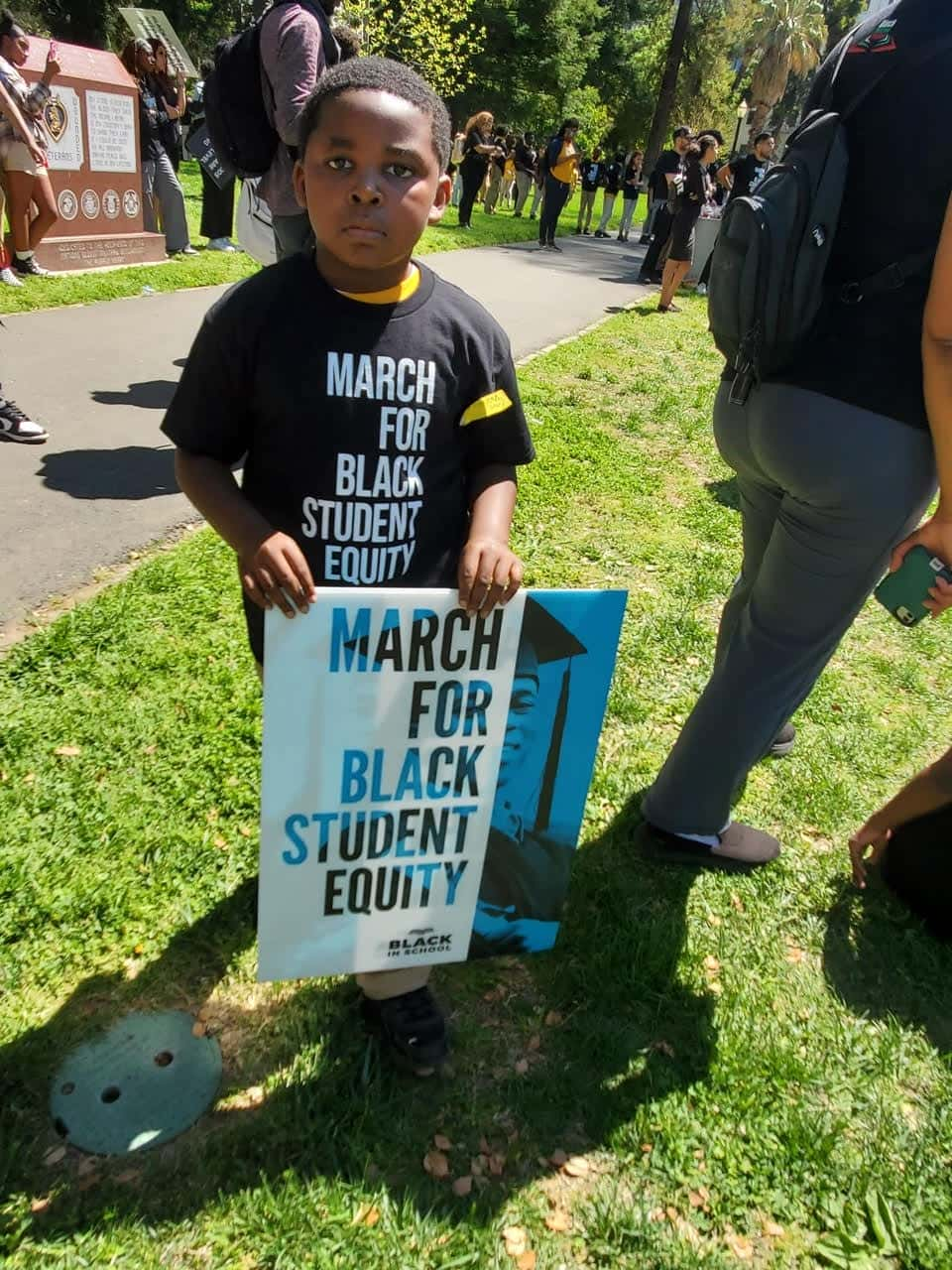During a recent gathering organized by the Black in School Coalition (BISC), a powerful force emerged in the form of over 2,500 K-12 students, parents, education advocates, and civil rights leaders marching to the California State Capitol. Their resounding demand? Increased funding for Black students in the state’s public schools. BISC, a statewide advocacy association comprising 17 organizations representing various stakeholders in the education community, has been fighting tirelessly for this cause. Their membership includes teachers, administrators, local school districts, county board of education trustees, and parents.

Governor Newsom pledges increased funding for Black students through LCFF.
The voices of BISC were heard, and Governor Gavin Newsom responded by committing to augment funding for Black students through the Local Control Funding Formula (LCFF) in the 2023 budget. The LCFF, a state law designed to provide funding to local school districts based on the specific needs of their students, already allocates additional funds to high-needs student populations such as English Language Learners, low-income students, and children in foster care or homeless youth.
The focal point of the BISC marchers’ demands was a plea to Governor Newsom and the California Legislature to refrain from implementing the “Equity Multiplier” proposed in the governor’s Education Budget. This proposal was intended to serve as an alternative to Assembly Bill (AB) 2774, which sought to secure dedicated funding for California’s lowest-performing group of students—Black students. However, advocates argued that the governor’s proposal fell short of adequately addressing this goal.
Governor Newsom expressed reservations about targeting funds specifically to a particular racial group, citing concerns about potential violations of Prop 209—a law that prohibits preferential treatment based on race. As a result, Assemblymember Akilah Weber, the author of AB 2774, withdrew the bill. Despite the chronic underperformance of Black students, they have not been officially identified as a high-needs population deserving of targeted funding.
READ ALSO: Sen. Marco Rubio Introduces Health SNAP Act to Restrict Assistance for Junk Food
2021-22 Statistics Reveal Disparities In Black Students’ English and Math Standards
Statistics from the 2021-22 academic year further highlight the urgent need for targeted support for Black students. Only 30% of California’s Black students met English standards, and a mere 15% met math standards, in stark contrast to 61% of White students meeting reading standards and 48% meeting math standards. These glaring disparities underscore the necessity of dedicated resources and support for Black students.
Governor Newsom’s equity multiplier proposal aimed to allocate $300 million in ongoing Proposition 98 funding to the LCFF, with the goal of closing opportunity and outcome gaps. The funds were intended for school districts with a high concentration of students eligible for free meals. While the governor’s plan sought to address racial disparities and improve student performance, critics argued that the proposed funding would only benefit approximately 6% of Black students statewide, receiving an estimated $18 million out of the proposed $300 million. The governor’s proposal primarily targeted around 5% of students in approximately 800 schools, predominantly serving Latino students. This disparity in funding for Black students outside of low-income schools led BISC to develop an alternative plan known as the Equity Multiplier.
BISC’s alternative plan proposed additional funding for any group that scores below the state average on at least two metrics on the California School Dashboard. Based on the latest dashboard results, Black and Native American students would qualify for this additional support. The alternative plan aimed to provide targeted resources to students with the most significant academic needs, building on the progress and improved outcomes observed when resources were concentrated on high-needs student groups.
Ahead of their march on the Capitol, BISC members and students presented their alternative budget proposal during the State Assembly’s education budget committee hearing. They advocated for redirecting the $300 million from the governor’s equity multiplier proposal to student groups performing below the state average on multiple indicators.
Under BISC’s alternative plan, per-student funding would increase from $713 to $3,318 for students with the greatest academic needs in California. This funding would be extended to an additional 81,617 Black students and 8,807 Native American students, compared to the governor’s proposal, which would cover an additional 22,699 Black students and 1,806 Native American students.
Christina Laster, the Western Regional Education Director of the National Action Network, noted that the governor’s equity multiplier mainly targeted low-income schools where relatively few Black students are enrolled. Instead, she recommended focusing on student groups that perform below the state average on multiple indicators, irrespective of their race. This approach would ensure that funding is allocated based on academic need rather than solely on racial identity.
Dr. Ramona Bishop, CEO of ELITE Public Schools, urged legislators to consider BISC’s alternative proposal for the equity multiplier. Standing alongside students, she emphasized the importance of providing care, attention, and the best efforts of those in power to all Black students in the state.
In response to the ongoing debate, a spokesperson for the governor’s office highlighted their shared ultimate goal with BISC, which is to eliminate opportunity and achievement gaps for Black students. The governor’s office believes that their proposal, which they consider more comprehensive and legally sound, offers a better option than AB 2774 and its related alternative proposal. They assert that their proposal has garnered support from members of the California Black Legislative Caucus, the California Association of African American Superintendents (CAAASA), the Superintendent of Public Instruction (Tony Thurmond), and others.
As the impasse between BISC and Governor Newsom persists regarding the best approach to direct state funding for educating Black students, it is worth noting that the California Department of Justice (DOJ), in a preliminary report written for the Task Force to Study and Develop Reparation Proposals for African Americans, recommended funding Black students through the state’s existing funding formula. This suggests that concerns about violating Prop 209 may not be insurmountable. Additionally, a recent report from the Legislative Analyst’s Office cautioned against approving funding for the Equity Multiplier, citing the existing targeted funding already provided to high-poverty schools.
Until a mutually agreeable solution is reached, it remains imperative for the state to persist in its efforts to identify and implement the most appropriate policies to support Black students in improving their academic performance. The focus should be on addressing the individual needs of these students rather than solely relying on their racial identity as the basis for funding and support. By ensuring equitable access to resources and opportunities, California can empower its Black students and pave the way for their success, regardless of their background.




